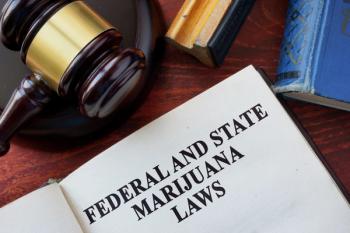
- Drug Topics September 2021
- Volume 165
- Issue 9
CBD Legislation Remains in Limbo
Selling CBD can be profitable for pharmacies, if they follow regulatory guidelines.
According to a 2019 Gallup poll,1 14% of Americans use cannabidiol (CBD) products, which makes the hemp derivative a potentially profitable addition to pharmacy shelves. However, the lack of a regulatory standard for selling CBD has created a gray area for pharmacists.
“What really makes that difficult is that as pharmacists we’re not comfortable operating in a gray area,” said Tim Gregorius, RPh, vice president of operations for PRS Pharmacy Services in Latrobe, Pennsylvania, and chief adviser for the National Community Pharmacist Association CBD resource page. “Our line of work is usually very cut and dried. You want to know how many you can sell and the exact strength and how to report it.”
In February 2021 the bipartisan bill HR 8412 proposed classifying and regulating CBD as a supplement. However, legislators await FDA input. Two years ago, the FDA promised a statement on CBD’s potential uses but research continues. The FDA has not issued a conclusion. HR 841, also known as the Hemp and Hemp-Derived CBD Consumer Protection and Market Stabilization Act of 2021, is identical to HR 8179,3 which was proposed in 2020. Both bills urge the regulatory agency to approve CBD for use in dietary supplements.
Before the Farm Act4 legalized hemp and hemp products in 2018, many individuals were already buying unregulated CBD products online. After the Farm Act passed, CBD products proliferated in retail markets while pharmacies faced a confusing patchwork of federal and local laws governing CBD sales.
“Pharmacy came to the game late, in 2018 and 2019,” said Gregorius. “We got there and said, ‘This is safe, there’s no THC [tetrahydrocannabinol], we’re going to sell this,’ and that’s where it got really sticky because a lot of state boards said, ‘No, you don’t.’ And in a few states, agencies such as the department of agriculture or the department of transportation had an issue. Nebraska had an issue where it was not the state Board of Pharmacy but it was the state Department of Agriculture that said, ‘CBD comes from marijuana and marijuana is illegal. Therefore, don’t bring it into our state.’”
Despite the growing number of states legalizing marijuana for medical and/or regulatory use, it remains illegal at the federal level. However, CBD has less than 0.3% THC, the compound responsible for the marijuana high, and the hemp product falls under the Farm Act. So far, the FDA has only approved5 1 CBD product, a prescription drug that treats seizures associated with Lennox-Gastaut syndrome, Dravet syndrome, or tuberous sclerosis complex.
The FDA has not approved any other therapeutic use for CBD. It cannot be used as a dietary supplement or added to a food product. Some state pharmacy boards have prohibited selling CBD, whereas others told pharmacists to follow existing FDA guidelines.
“Those are the only things the FDA has been clear about,” said Gregorius. “And the state boards of pharmacy said, ‘We are not going to stop you from selling it because it is not illegal. It doesn’t have THC.’ If the FDA says, ‘If you’re going to sell it, we’re going to look the other way’—which is effectively what their enforcement discretion says—then sure, go and sell it. Just make sure you do it under FDA guidelines. And that’s where we are now.”
In March 2021, the FDA issued warning letters6 to 4 companies for selling CBD products, citing a violation of the Federal Food, Drug, and Cosmetic Act. Although these letters raise the possibility of seizing CBD products, they are targeted at manufacturers who do not meet the requirements to legally market their products. Pharmacists need not worry if they follow the existing guidelines.
“What we’re telling pharmacies and what the state boards of pharmacy are telling pharmacists is just don’t make those claims,” said Gregorius. “The manufacturers who are making those claims on their packaging and in their marketing are the ones that are the target of the FDA.”
References
- Brenan M. 14% of Americans say they use CBD products. Gallup. August 7, 2019. Accessed July 30, 2021.
https://news.gallup.com/poll/263147/americans-say-cbd-products.aspx [RP6] - Hemp and Hemp-Derived CBD Consumer Protection and Market Stabilization Act of 2021, HR 841, 117th Cong (2021). Accessed July 30, 2021.
https://www.congress.gov/bill/117th-congress/house-bill/841/all-actions?r=24&overview=closed&s=2#tabs [RP7] - Hemp and Hemp-Derived CBD Consumer Protection and Market Stabilization Act of 2020, HR 8179, 116th Cong (2019-2020). Accessed July 30, 2021.
https://www.congress.gov/bill/116th-congress/house-bill/8179 [RP8] - Hemp Production and the 2018 Farm Bill; testimony before the Senate Committee on Agriculture, Nutrition, and Forestry (testimony of Amy Abernathy, MD, PhD, principal deputy commissioner, Office of the Commissioner, Food and Drug Administration, Department of Health and Human Services). FDA. July 25, 2019. Accessed July 30, 2021.
https://www.fda.gov/news-events/congressional-testimony/hemp-production-and-2018-farm-bill-07252019 [RP9] - FDA regulation of cannabis and cannabis-derived products, including cannabidiol (CBD). FDA. Updated January 22, 2021. Accessed July 30, 2021.
https://www.fda.gov/news-events/public-health-focus/fda-regulation-cannabis-and-cannabis-derived-products-including-cannabidiol-cbd [RP10] - Warning letters and test results for cannabidiol-related products. FDA. Updated March 22, 2021. Accessed July 30, 2021.
https://www.fda.gov/news-events/public-health-focus/warning-letters-and-test-results-cannabidiol-related-products [RP11]
Articles in this issue
over 4 years ago
Acne Treatment Meets End Points in Studyover 4 years ago
Selling CBD in the Pharmacyover 4 years ago
Build a Successful Hospital Pharmacy Analytics Programover 4 years ago
Why Pharmacists Are Stressed Out, and How to Improve Self-careover 4 years ago
Getting Patients Immunized Against Pneumonia Is Importantover 4 years ago
Boosting Confidence in CBD Counselingover 4 years ago
Artificial Intelligence Has Come in Wavesover 4 years ago
Ovarian Cancer Treatment Update and Pharmacists' Roleover 4 years ago
Biden Pushes for Lower Drug Prices in an Executive OrderNewsletter
Pharmacy practice is always changing. Stay ahead of the curve with the Drug Topics newsletter and get the latest drug information, industry trends, and patient care tips.























